Posted by Cameron on 06.29.07 7:03 AM
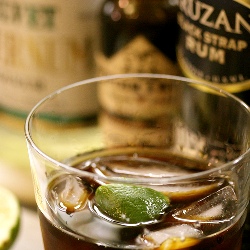 I am not an enormous fan of rum, except for when I’m vacationing in a tropical clime. Then, it’s practically the only thing that I want to drink. I blush to think of how many Painkillers I put away during our too-brief trips to the British Virgin Islands, and as soon as my feet touch the ground in Hawaii, I develop a thirst for Mai Tais that strains the bounds of good taste.
I am not an enormous fan of rum, except for when I’m vacationing in a tropical clime. Then, it’s practically the only thing that I want to drink. I blush to think of how many Painkillers I put away during our too-brief trips to the British Virgin Islands, and as soon as my feet touch the ground in Hawaii, I develop a thirst for Mai Tais that strains the bounds of good taste.
But take the boy out of the tropics and the desire fades. The fruity mixtures never taste as good back in the real world, and when the going gets hot, I’d just as soon have a tequila (or gin) and tonic or a cold beer.
This week’s drink may change that, as I’ve fallen in lust with Cruzan Black Strap rum. It’s the perfect liquor to have a summer fling with: a bold, sexy troublemaker that dares you to stay out late. You know that by the end of the summer it will seem pushy and cloying, but until then: wow, what a body.
The enabler of my infatuation is the Corn ‘n’ Oil, a traditional drink from Barbados and other points Caribbean. The essential ingredients are rum and falernum — beyond that the proportions and additions vary greatly. For the rich, sweet Black Strap, use the recipe below. If you’re using a paler rum, double the falernum and ease off on the bitters and lime.
Want more? Allow me the honor of introducing you to several worthies who have written extensively on both the provenance of the drink and the history of (and creation of): falernum. Like the man said, I stand on the shoulders of giants.
Corn ‘n’ Oil
2 oz Cruzan Black Strap rum
1/4 oz Velvet Falernum
2-3 dashes aromatic bitters
Juice of 1/4 lime
Build over ice in double old-fashioned glass.





Drink of the Week, drinks, recipes
3 Comments »




Posted by Cameron on 06.28.07 7:00 PM
 At the beginning of June, we celebrated our fifth anniversary and spent part of the weekend in Napa. One of the highlights was a stop at Hoffman Farms. As Anita has written, we picked seven pounds of green walnuts in the dappled shade of a stand of trees that pushed up from dry, level soil.
At the beginning of June, we celebrated our fifth anniversary and spent part of the weekend in Napa. One of the highlights was a stop at Hoffman Farms. As Anita has written, we picked seven pounds of green walnuts in the dappled shade of a stand of trees that pushed up from dry, level soil.
Mr. Hoffman was kind enough to tell us what to look for as we picked, and we had the pleasure of chatting with him about his farm while we visited. Being around so many growing things started me thinking about our own garden — the experiment in edible landscaping that we began shortly after we moved into Chez Moultrie.
When we bought our house, the back forty (feet, that is) was absolutely disgusting: a flea-infested dirt-pit and dog-toilet, dominated by a sterile avocado tree, a junk fruit tree, a bottlebrush tree, and a badly overgrown magnolia. The avocado was as tall as the house and leaning dangerously, the “fruit” tree produced small cherry-like things that tasted awful, and the bottlebrush was also as tall as the house and sported a canopy at least 20 feet wide. Even though we had a list of house renovation projects as long as the trees were high, we had learned our lesson from a previous series of “why didn’t we do that sooner” landscaping episodes. The backyard would be our first project.
As our guiding principle, we decided that we would only choose plants that would produce fruit or could be eaten. We had a couple of must-haves (or rather, “hope-they’ll-grows”), and we enlisted a local landscaper to help choose the rest. We started work in March 2006, and by the end of May our backyard was transformed. Just slightly over one year later — and with summer beginning — it seems like a good time to take a full tour. I’ll spread it out over a few episodes so that we don’t get too tired. Put on your grubbies, and let’s get started.
We enter the yard from the lower deck, down a couple of steps to the patio. On the left, you’ll notice our bed of lavender. If it looks a bit disheveled, it’s because I took to it vigorously with the clippers a few weeks ago. If there’s one thing that I can’t abide, it’s uppity lavender, and this pack had started acting like it owned the place. Nevertheless, it’s pretty and it smells good. Unfortunately, smelling good is about all that this particular breed is good for; I asked for lavender, but I didn’t specify the type, and our type doesn’t do so well for cooking. On the bright side, the flowers make a very pretty garnish and if we need insecticide or air freshener, we’re all set. Live and learn — and maybe rip and replace with a culinary variety next year.
Continuing along the deck fence line, we see Lazarus the Lemon Verbena. This past winter, while facing a Day of the Triffids-caliber invasion of oxalis and other assorted weedy marauders, I’m ashamed to say that I resorted to chemical defenses. Powerful chemical defenses that came in spray bottles with warnings on the back and front. Careful as I was, some of the nearby plants paid an awful price including, I thought, the verbena. Within days, every single green leaf turned brown and dropped off, leaving behind a bleached tangle of branches lashed to the fence like a skeleton in a roadside gibbet.
Crushed and guilty, I wrote it off but left it in place, lacking the time or the energy to tear it out. Lo and behold, as winter turned to spring, the small green tips of fresh leaves poked out on a few branches. Today, it swaggers with such rude health that we’ve stopped shooing the dogs away from it; as far as they’re concerned, it’s one big salad bar. Did it really die and return to life? Well…no. My adventures with weed control happened to coincide with a few frosty evenings and the leaf drop was as natural as the seasons turning. We haven’t yet made the verbena the subject of a food project, although it did play a supporting role as garnish in last week’s Le Bourget. But the plant is waving about with such vigor that it’s only a matter of time — I’m sure it could spare a few leaves so that we can try our own version of Shuna’s verbena-infused ice cream, or perhaps an infusion.
And even though the verbena was just doing what plants do, the shower of brown leaves was an accusation as penetrating as the beating of that tell-tale heart. I don’t know what I’ll do when the next rainy season animates a green army of weeds, but I’ve sworn a mighty oath to resist the lure of chemical solutions (if you’ll forgive the pun). As I write this, I’m waiting for the sun to go down so that I can retrieve the container of ladybugs currently hibernating in our downstairs refrigerator and release them in the yard: a beetle Delta Force ready to kick some aphid butt.
Next time: The Northside Fruit Preserve and the magnolia that goes both ways!
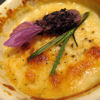
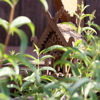
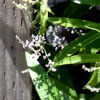
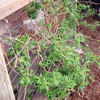

garden
3 Comments »




Posted by Anita on 06.24.07 8:07 PM
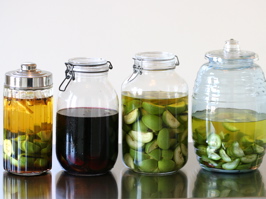 Every June 24, Catholics around the globe celebrate the feast-day of John the Baptist. And every year, on that same day, traditional-minded Europeans head into their local walnut orchards, filling baskets and bags with unripe nuts in order to make nocino, an Italian walnut liqueur, or its French cousin vin de noix.
Every June 24, Catholics around the globe celebrate the feast-day of John the Baptist. And every year, on that same day, traditional-minded Europeans head into their local walnut orchards, filling baskets and bags with unripe nuts in order to make nocino, an Italian walnut liqueur, or its French cousin vin de noix.
We’ve made nocino every summer for the past three years, usually a bit later than the traditional saint’s day due to trouble in our local supply chain. Suffice to say that we lack the necessary ferme, fattoria, or bucolic farmhouse of any sort, and we’ve relied either on nuts shipped from afar or the whimsical schedule of a certain vendor at the Alemany market.
This year, we not only avoided our usual delay, we even jumped the gun a bit. But I hope you’ll agree our motives were good: We were off to Yountville for our anniversary, and I’d remembered reading Shuna’s story last fall about Hoffman Farm, a Napa u-pick with a vast walnut orchard. The idea of making liqueur with nuts we’d plucked ourselves from local trees was simply too attractive to pass up, no matter the date was a tad early.
It took me days to work up the nerve to call John Hoffman and explain what I had in mind. He’d never heard of anyone wanting green walnuts before. “You do know they’re incredibly bitter?” he asked me on the phone. But he graciously allowed that we might stop the coming weekend and pick some nuts, as long as we didn’t come on Sunday morning during church. I assured him that we’d work around his schedule, and would be sure to call before we came, in any case.
Saturday rolled around, bright and sunny. We called Mr. Hoffman to make sure he was home, then donned hats and sunscreen and pointed the car toward Silverado Highway. Just past the intersection with Trancas, we spied the farm’s little sign, a blink-and-miss-it affair. We pulled up the gravel drive and found Mr. Hoffman waiting for us in the shade near his farmhouse garage.
We introduced ourselves and chatted a bit, and he asked me to remind him about what I would do with my early harvest. I explained about splitting the nuts and soaking them in alcohol for most of the summer, then setting aside the strained, sweetened infusion until Christmastime. I marveled that a walnut farmer — and one with Italian in-laws, at that — had never tasted what I’d always assumed was a relatively common homebrew. Not only had he never made it, he’d never even heard of it. Chuckling, he quipped: “Sounds like a waste of a good bottle of vodka,” and winked at Cameron.
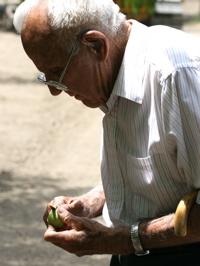 Then he picked up his cane and strolled us out into the orchard. A sun-dappled canopy of walnut boughs stretched as far as the eye could see, all the way back to the crossroads. Mr. Hoffman showed us how to avoid the nuts that suffered from blight — they were few, this early in the season — and how to spy the telltale bore holes of caterpillar infestation. He reached for his pocketknife and cut open one of the few rotten nuts he could find, to show me how the fungus penetrates the hull and works its way to the developing meat.
Then he picked up his cane and strolled us out into the orchard. A sun-dappled canopy of walnut boughs stretched as far as the eye could see, all the way back to the crossroads. Mr. Hoffman showed us how to avoid the nuts that suffered from blight — they were few, this early in the season — and how to spy the telltale bore holes of caterpillar infestation. He reached for his pocketknife and cut open one of the few rotten nuts he could find, to show me how the fungus penetrates the hull and works its way to the developing meat.
It was a botany tutorial, a history lesson, and a glimpse at a disappearing way of life. The Hoffmans have worked this land since the end of World War II. Now, they’re farming one of Napa’s few remaining diversified acreages, as vineyards squeeze out the fruits and nuts that once were the valley’s pride. As Shuna mentions, although the Hoffman land is protected for agricultural use, there’s nothing to prevent these noble trees from being torn out in favor of yet another mass of wine grapes.
After a half hour of picking nuts and snapping photos in the late-morning glow, we brought our canvas sack back to the garage. Mr. Hoffman discussed how to price our unusual transaction while he weighed our haul on his weathered scale. When all was said and done, he refused to take more than a fraction of what we’re used to paying, even when we told him that the going rate was much, much higher. He shook his head like we were citified fools, then added: “You can keep the quarters if you tell me that recipe again.” I smiled broadly and promised to send him prints of the photos we’d taken, plus a few different recipes to try.
We grinned all the way home, amazed at our good fortune in finding Mr. Hoffman — all thanks to Shuna.
After stopping by the local liquor depot for bottles of 100-proof vodka, I quickly set to work halving and quartering the green nuts, measuring sweeteners and spices, and sterilizing my infusing jars. Never had I had the luxury of using nuts picked within hours of infusing, much less 7 pounds worth gathered with my own two hands. Unsurprisingly, we had sufficient nuts for two different batches of nocino — my usual recipe, plus an experiment — as well as a version of Abra’s traditional vin de noix and Lucy’s lighter recipe made with white Burgundy and maple syrup.
I left my quartet of crockery on the new breakfast table for a day or two; they caught the light so beautifully that I wanted to see them (and sneak a sniff of them) all the time. Once the liquids steeped to a black-hole opacity, I followed tradition and put them out in the garden — in this case, the back deck — where they’ll commune with nature for the next 40 days and 40 nights. Then we’ll filter them, bottle them, and wait for the other end of the year, when midwinter brings us yet another celebration of the natural cycle disguised as a religious feast.


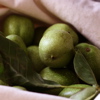
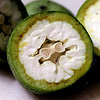
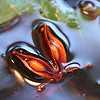
Hoffman Farm
2125 Silverado Trail
Napa, CA 94558
707 226-8938
drinks, holidays & occasions, Italian, locavore, Napa & Sonoma, preserving & infusing
13 Comments »




Posted by Anita and Cameron on 06.22.07 7:02 AM
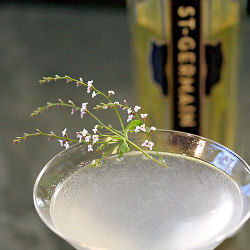 Let’s get one thing straight right off the bat: St-Germain, the new liqueur that’s sending ripples across the cocktail scene, comes in a bottle so beautiful that it will make you forget your budget, your better judgment, and most of your morals.
Let’s get one thing straight right off the bat: St-Germain, the new liqueur that’s sending ripples across the cocktail scene, comes in a bottle so beautiful that it will make you forget your budget, your better judgment, and most of your morals.
The producers call their elderflower-scented concoction “vie parisienne en bouteille” and from the look of things, they’re not far off. The shape is impressively soignée, in a luxe Art Nouveau style. The labels, too, are gorgeous — even the adhesive surface sports a gentle tapestry scroll, so as to please the eye when seen through the other side of the glass. Trés elegant.
According to an impossibly precious marketing backstory, hand-picked wild elderflowers are macerated and combined with eau de vie. The result is a liqueur that balances citrus and floral notes as gracefully as a skilled waiter carries a tray of cocktails. A heavy hand with the sugar is perhaps the liqueur’s only limitation; you need a steady resolve and a miser’s touch to make a drink that captures St-Germain’s floral notes without edging into tooth-aching sweetness.
Smart folks, these Germainistes: They’ve recruited many of the cocktail world’s leading lights to wax rhapsodic about their products, both around the web and in an adorable little booklet attached to every bottle. Alas, the recipes it contains are less successful, leaning toward the cloying and bizarre. Mon dieu! Drinks featuring green-apple vodka and pineapple juice — mercifully, not together — aren’t exactly consistent with the swanky image they’re painting with the rest of the brand messaging.
Left to our own devices, we successfully used a splash and a half of St-Germain to create impromptu Champagne cocktails. Meanwhile, we considered drinks that could benefit from the liqueur’s mysterious undertones without collapsing under the sugar’s weight.
We didn’t have to go far down our roster of possibilities to encounter a combination that puts this floral mixture in a flattering light. We started with a traditional Aviation, replacing the maraschino liqueur with St-Germain. The elderflower twines well with the lemon, but you may need to gently tinker with proportions to compensate for sweeter or more acidic fruit. Lime makes a pleasant alternative, should you be so disposed.
We christened our variation Le Bourget, in honor of the once-bucolic airfield where Lindbergh landed the Spirit of St. Louis after his landmark flight; nowadays it’s a bustling commuter hub and the home of the biannual Salon International de l’Aéronautique where — this very week — French aircraft manufacturers are touting their wares to potential clients. What better moniker for a French Aviation?
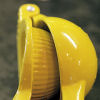


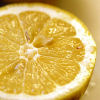
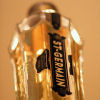
Le Bourget
2 oz gin
1/2 oz St-Germain elderflower liqueur
1/2 oz fresh lemon juice
Shake well with ice, and strain into a chilled cocktail glass.
Drink of the Week, drinks, recipes
7 Comments »




Posted by Anita on 06.19.07 3:11 PM
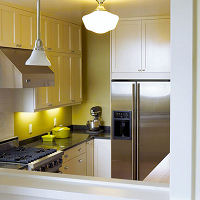 I know it’s been months, literally, since I told you we were almost done, and promised an update soon. And truth be told, it did take a lot longer to nail down the last details than we expected. Just over a month ago, I wrote to family and friends, telling them we were done, at long last:
I know it’s been months, literally, since I told you we were almost done, and promised an update soon. And truth be told, it did take a lot longer to nail down the last details than we expected. Just over a month ago, I wrote to family and friends, telling them we were done, at long last:
“Every item on the punch list is crossed off. The permits are all final-ed. The kitchen countertops are securely affixed to the cabinets. The new sidewalk — and driveway, and drain — is in place.”
Sidewalk? Driveway? Huh? I thought this was a kitchen remodel?
Yeah, well… long story short: When the city came out to ‘final’ the permits for the kitchen, the inspector noticed that our sidewalk wasn’t quite level. Now, almost every driveway in San Francisco leaves a little divot in the sidewalk, to allow cars access to below-ground garages. They’re not (usually) a serious detriment to public safety, and our gradual, 2-inch slope definitely didn’t pose a hazard. But the planning department, lord love them, have decided they need a new source of income. (According to a Realtor friend, this sort of thing is happening all over town.) So even though our sidewalk wasn’t any worse — and in fact was much better — than most of our neighbors’, our kitchen permit gave the city an excuse to hunt for anything else they could find to generate some cash. Nice, eh?
Of course, there’s always a silver lining: We got a smooth new driveway out of the deal, complete with a much-needed trench drain to keep water from running into the garage. During excavation, it became obvious that installing said drain meant moving — and thus, replacing — an 80-year-old water-supply pipe. Oh, boy! More money flying out of my purse! Still, it needed to be done: One look at that photo and you can guess that our water pressure is vastly improved, not to mention that our tap water is a lot less crusty. Bleh!
But back to the kitchen: After an escalating six-week stream of coaxing, cajoling, criticizing, and (ultimately) crying, our contractor harrumphed back and deigned to wrap up the punch list. Cabinet knobs at last! No more sagging utensil drawers! Oh, the joy.
We’ve been so busy cooking and entertaining that we haven’t have much time for food blogging, much less documenting the last remodel steps. Luckily, our architect, the affable and talented Andrew Mann, spurred us to action by stopping by to take some portfolio shots. Late last week, he sent us the proofs… and, wow. I mean, I knew how gorgeous our kitchen was, but seeing it through the eyes of a professional artist makes a world of difference. I got a little teary-eyed looking at the photos and forgot, at least for a moment, about how painful the last months of construction had been. In my wildest dreams, I would never have thought we’d live and cook in a magazine-worthy kitchen, but there it is.
Inevitably, we still have a few items to tackle, more in the scope of decorating than real remodeling. Since we can’t afford the sort of narrow Parisian bistro table we covet for the breakfast room, we bought a temporary placeholder. (Although party guests complimented its DWR-esque looks over the weekend, and our housekeeper chased us down just to tell us it was ‘perfect’, so maybe it has an appeal we’re not seeing!) We still need to make cushions for the breakfast bench, and order the window coverings… morning sun is brutal at this time of year.
But really, there’s no denying it: The kitchen’s done. Ta-dah!




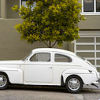
photos courtesy Andrew Mann Architecture and Joseph De Leo Photography
kitchen
12 Comments »




Posted by Anita on 06.15.07 7:02 AM
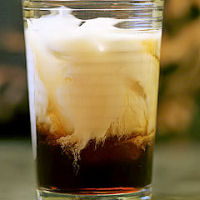 This month’s Mixology Monday, Creme de la Creme, features drinks made with cream-based liqueurs.
This month’s Mixology Monday, Creme de la Creme, features drinks made with cream-based liqueurs.
When our hostess, Anna, allowed that “lazy bums can include cream in their cocktail” in lieu of a cream liqueur, my path became clear.
“Sometimes, there’s a man, well, he’s the man for his time and place. He fits right in there. And that’s The Dude, in Los Anglez. And even if he’s a lazy man — and The Dude was most certainly that. Quite possibly the laziest in all of Los Anglez County, which would place him high in the runnin’ for laziest worldwide.”
A perfect inspiration for lazy, creamy-cocktail drinkers everywhere, wouldn’t you say?
For those of you not acquainted with the Coen Brothers’ 1998 noir parody, The Big Lebowski …well, there’s no way I could possibly convince you of its worth in 20 words or less. Suffice to say that its hysterical, convoluted plot finds room for Jeff Bridges, John Goodman, Steve Buscemi, Julianne Moore, Phillip Seymour Hoffman, John Turturro, Flea, and Tara Reid all on the same screen. It’s a rollicking two hours filled with mistaken identities, bowling tournaments, extortionate Nihilists, and many, many White Russians.
Right there in the opening scene, we find our hero Jeffrey Lebowski — known to all as The Dude, or “His Dudeness, or Duder, or El Duderino if you’re not into the whole brevity thing” — strolling through his local Ralphs. He picks a carton of half-and-half out of the dairy case with a connoisseur’s care, pausing to open the container and sniff the contents.
That particular carton meets a sad fate well before finding its way into The Dude’s signature cocktail, but never fear: Many a vodka-Kahlua-cream concoction appears in The Dude’s mitts as the story unravels. One even serves as the vehicle for a nasty plot twist…
“But… aw, hell. I’ve done introduced it enough.”
Like most cocktails that have been around the block a time or two, the White Russian sports plenty of variations, and a number of competing formulas. The “official” recipe seems a bit out of synch with common usage, proposing a 5:2:3 (vodka, Kahlua, cream) ratio. Most cocktail manuals and drink sites lean more toward a 4:2:1 mix, which I prefer. More vodka seems fine, but an abundance of cream quickly overpowers the Kaluha.
Of course, you could do as many folks — including The Dude, it should be noted — do, and swap the cream for a lighter dairy product. Half-and-half makes a pleasant drink; whole milk will do in a pinch; I can’t recommend low-fat or any of that other what-have-you.





White Russian
2 oz vodka
1 oz Kahlua
1/2 oz cream (or half-and-half, if you’re not into that whole gluttony thing)
Combine the vodka and Kahlua in an ice-filled rocks glass. Float the cream on top.
Drink of the Week, drinks, Mixology Monday, movies & tv, recipes
9 Comments »




Posted by Anita on 06.11.07 11:43 PM
 In my youth, I was actually something of a photo geek: I built a darkroom in my parents’ garage, I worked for my Dad all summer between 8th and 9th grade to buy my first SLR, and I won a school-wide award for photography a year later. I was, even then, a tinkerer, a collector of gadgets and gizmos.
In my youth, I was actually something of a photo geek: I built a darkroom in my parents’ garage, I worked for my Dad all summer between 8th and 9th grade to buy my first SLR, and I won a school-wide award for photography a year later. I was, even then, a tinkerer, a collector of gadgets and gizmos.
By all rights, you’d think an equipment geek like me would have some big, black, long-lensed monstrosity… when instead I actually tote a cute, shiny, pocket-sized snapshot-maker. I’ve looked longingly at the gorgeous shots created by those who own the real deal, all the while coaxing my poor little PowerShot into giving up decent photos.
Cameron — who hails from a photo-obsessed clan — hasn’t helped matters. He’s been egging me on to purchase a dSLR for months, reminding me of the old adage that equipment should always be better than the human behind it. I knew he was right, but I felt like I couldn’t justify the expense: I’d just upgraded my point-and-shoot last November, a purchase that set me back far more than I really wanted to spend. And ultimately, the blog’s just a hobby… it’s not like anyone cares whether the image is a little noisy, or the lens distortion gets a little distracting.
Early last week, my equipment envy reached a peak. A friend who just started blogging mentioned that he’d splashed out for some gear to help improve his online shots. I replied covetously, saying something to the effect of “I wish I could buy a dSLR, but it’s not like I have a spare grand sitting around.”
And then, two very interesting things happened.
I got home, opened the mailbox, and found a check — a completely unexpected payment for something I did on a lark more than a year ago — for $945. Not quite a grand, it’s true, but you could say that the universe had succeeded in grabbing my attention.
The next morning, I noticed a lot of inbound blog traffic from a link called “DMBLGiT: The Winners!” I clicked the tracking URL, and my jaw hit the keyboard. Holy cats: I’d tied for first place in this month’s Does My Blog Look Good in This?, the food-bloggers’ photo contest! I’d never even entered before, and I’m up there on the big screen with DPaul & Sean, and Ilva, and plenty of other talented folks whose blogs I read regularly and whose photos make me swoon. It’s so ridiculous, I still don’t really believe it. But does that stop me from celebrating? No, it most certainly does not. Celebrating is something I understand very, very well.
The rather obvious end of this little tale: I am now the proud owner of a brand-spanking new Canon 30D. At last, a real camera. Interchangeable lenses! A usable viewfinder! And best of all, as Cameron says, “It makes that Girls on Film noise!”
We took the new toy up to Napa this weekend, and both of us captured a surprising number of lovely shots, considering we hadn’t even read the manual yet. (No, I didn’t haul this behemoth out at The French Laundry. Shuh… even I have my limits!) I know it’ll take a while before I dial in the seemingly limitless new features at my disposal — no film camera was ever this confusing …or have I just gotten old? But in the meantime, if you keep an eye on my photostream, you’ll get to see me take my first baby steps back from the point-and-shoot realm.





equipment, geekery, other blogs, other stuff
10 Comments »




Posted by Anita on 06.08.07 12:43 PM
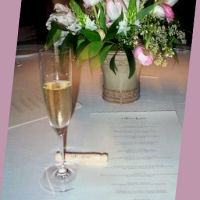
We’ll be away from the blog for a few days. We have an occasion to celebrate, and dinner reservations at a special place tonight. (Please forgive the photo — it was the best of the roll from our last visit in 2005!)
I’m stunned to realize that it’s been more than two years since we visited Wine Country. Is it possible we haven’t been back since we left Seattle? That’s almost as hard as it is to believe that it’s been five whole years ago since we were married, just on the other side of the hills in Sonoma County.
Have a great weekend. I know we will!
holidays & occasions, Napa & Sonoma, restaurants
9 Comments »




Posted by Anita on 06.07.07 11:02 PM
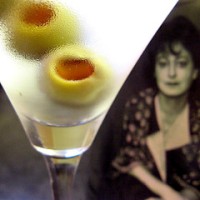 I like to have a martini,
I like to have a martini,
Two at the very most.
After three I’m under the table,
After four I’m under my host.
Michael at A Dash of Bitters reminds us that tonight marks the 40th anniversary of Dorothy Parker‘s demise. She died not, as one would expect (and she might have preferred) from suicide or cirrhosis, but from a heart attack in old age. Her modern notoriety hinges on witty bon mots and wry verse, but in her heyday she was nothing short of a cultural icon, a woman who led trends and set tongues a-wagging.
Mrs. Parker found fame as Vanity Fair‘s drama critic, and later reviewed books for the New Yorker under the sobriquet “Constant Reader”. She penned a pile of short stories, and her semi-autobiographical Big Blonde (although she was a dainty brunette) won the O. Henry prize for short fiction. Later, she and her second husband Alan Campbell became a sought-after Hollywood screenwriting team; the original, Oscar-winning A Star is Born topped their credits.
Although much of the Parker mystique hinges on her wisecracking party-girl persona, in fact she was a near-teetotaler for part of her life. In her twenties, she hardly drank at all. Her biographers tell us that she weathered the ironic excesses Prohibition better than many. One or two drinks a night would be plenty for her, in an era and milieu when an evening on the town typically started at sundown and lasted until breakfast at dawn.
As the years progress, the drinks get stiffer: Dottie’s small beer on the bar beside her pal Robert Benchley‘s large Scotch, an Orange Blossom at the speakeasy, Manhattans at her country house, and, eventually, all-night parties fueled by pitcher after pitcher of Martinis (with no food!). Sweet misery — imagine the mornings after those night-befores:
Drink and dance and laugh and lie,
Love, the reeling midnight through,
For tomorrow we shall die!
(But, alas, we never do.)
In the Algonquin era, the Martini had not yet suffered from modern innovation. None of the Round Table denizens would have recognized the drink as anything other than a well-chilled mixture (always stirred, never shaken) of five or so parts gin to one part dry vermouth, and a dash of orange bitters. No gin, no Martini. If olives weren’t at hand, a simple lemon twist could be substituted, but even this would be noted as a touch unorthodox. One can only imagine what the Vicious Circle would make of so-called Martinis of chocolate, sour apple, or (God forbid) vodka.
Martinis made in the classic style fell out of fashion through the years; some speculate that a lack of proper bitters hastened the drink’s metamorphosis into little more than a bruising-cold glass of gin. Thankfully, renewed interest in classic cocktails means there’s an abundance of delectable orange bitters to choose from today. Our house brand is Regan’s, with a bottle of Hermes on hand as a pleasant alternative. But you’re more likely to find Fee Brothers’ in your local liquor establishment, and that will certainly do just fine. I daresay that once you try your Martini made this way, the modern rendition will seem rather flat and unappealing.
Now, what’s stopping you? As Mr. Benchley would say: Get out of that wet coat and into a dry martini.

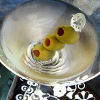
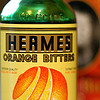
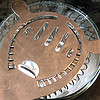
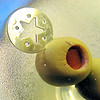
Classic Martini
1-1/2 oz gin
1/2 oz dry vermouth
1 dash orange bitters
Stir with ice, and strain into a chilled cocktail glass. Garnish with olives or a lemon twist.
Drink of the Week, drinks, literary
5 Comments »




Posted by Cameron on 06.06.07 8:40 AM
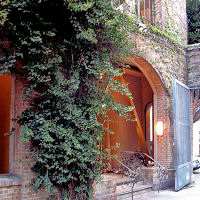 The descriptions of the food, physical locations, and presidential travel are either factual or based on our own experiences. The rest is best described like this…
The descriptions of the food, physical locations, and presidential travel are either factual or based on our own experiences. The rest is best described like this…
Once upon a time, there was a restaurant named Hawthorne Lane. It was a very fine restaurant, with white tablecloths and brightly polished silverware. The restaurant was quiet and serious, with well-mannered waiters who would ask if you cared for another glass of iced tea—served with a miniature pitcher of sugar syrup—or perhaps some more wine.
The restaurant lived on a little stub of an alley that was also called Hawthorne Lane. Hawthorne Lane (the alley, not the restaurant) wasn’t a very large alley, but it was also very fine, with tall brick walls covered with ivy, and arches to walk through.
Hawthorne Lane (the restaurant, not the alley) was successful. It served delicious food to people who dressed well and enjoyed being asked if they cared for another glass of iced tea, or perhaps some more wine. Everyone thought very highly of the restaurant and told it so. One day, the president of the entire country came for lunch, and his big Southern laugh could be heard echoing through the ivy-covered arches.
But one evening—as it watched the light glow through its windows and listened to the thousand tiny clinks of polished silverware—the restaurant noticed something that it had never seen before. While everyone seemed to be enjoying themselves, they also seemed to be working very hard, not just the waiters and the cooks, but even the guests. When they talked, they were careful to keep their voices evenly pitched. Even when they laughed—which happened often, because the restaurant was truly pleasant—they seemed to catch themselves, as if everything that they did needed to be as brightly polished as the wine glasses, as crisply starched as the linens.
When the restaurant realized how hard its guests were working, it became sad. It wondered if being fine and well-mannered made everyone just a tiny bit uncomfortable. And—after much thought—it decided that it would rather be a restaurant where people felt relaxed when they visited.
Away went the white tablecloths and the elegant dining room. In came dark wood paneling and light fixtures that looked like grass skirts made out of tan suede. There was also a chandelier that looked like it was made out of real antlers, because the restaurant thought that it ought to have one thing that was very silly, and the chandelier was very silly indeed.
The waiters were outfitted in T-shirts and sleek trousers. The service was a bit less polished, but it was undeniable that everyone was having more fun, which helped the guests to feel comfortable. The host dressed smartly in a suit and tie, but he also wore canvas sneakers, knowing that it was important to be just a little bit silly. Instead of quiet music, the restaurant played rock-and-roll, including Emotional Rescue by the Rolling Stones, because it liked the part at the end of the song where Mick Jagger talks about riding a horse across the desert.
The restaurant created an interesting cocktail list with lots of inventive drinks. One of the best was a hold-over from the restaurant’s past, a Greyhound-like drink called the Royal Hound with very tiny, very delicious pieces of dried grapefruit stuck to the rim of the glass. The restaurant found a clever wine expert, who created a new wine list with a section of 50 wines priced less than $50 per bottle, because it wanted its guests to feel like they could try different things without worrying about the price.
The restaurant thought that the food on its new menu should be less proper than before, but still interesting and exciting. It greeted each guest with a plate of crunchy, cheesy crackers and small, rich chive biscuits that disappeared so quickly that the restaurant wondered how anyone could possibly eat them so fast.
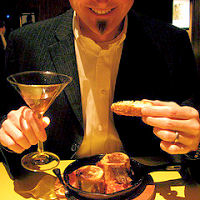
Wanting to serve food that made people feel comfortable, the restaurant offered an absolutely delicious chopped salad, and a tasty wedge of iceberg lettuce with St. Agur blue cheese dressing. There were richer starters, such as potato skins with very good housemade bacon, and deep-fried clam strips with tangy aioli. The appetizer list also included unusual foods like headcheese and marrow bones, both of which were well prepared indeed. One of the visitors didn’t like the tomato sauce that came with his bones, but he happily ate all the marrow anyway.
The restaurant struggled a little bit with its pasta courses; the pappardelle with peas and ricotta was heavy and bland, and the rock-shrimp linguine was rather ordinary. However, the guests liked the spaghetti dressed with uni and breadcrumbs, remarking on how comforting and homey the dish tasted, in contrast to how unusual it sounded.
The restaurant recovered its balance for the main courses. The pork schnitzel was perfectly fried, juicy, and not the least bit greasy; braised lamb cheeks on polenta had at least one person licking the plate. If the hamburger was somewhat dry, at least it was cooked medium-rare all the way through, just the way the guest had asked.
That only left the dessert menu, and the restaurant had to admit that it was puzzled, as one couple absolutely did not like any of their desserts. On one night, they complained that the jelly doughnuts were overfilled. On another night, they said that neither the ice cream nor the cookies in the baby ice-cream sandwiches tasted at all good. The restaurant understood that not every person would like every dish, but it couldn’t understand why these two were so upset when so many other people said nice things about the desserts. But the restaurant was a very wise restaurant and understood that these were small problems. And that there’s no pleasing some folks.
The restaurant has been busy for several months now, content with its new look, new mission, and new name. It is quickly winning new friends, as people visit and tell others that they should go. Some diners are drawn by the buzz, as restaurant-goers often are. Others hold memories of what the restaurant once was, like the young lady who popped in one day looking for the old, elegant, white tablecloth restaurant. Maybe she wanted some of the iced tea served with the little pitcher of sugar syrup. The host in his suit and basketball shoes smiled at her.
“We used to be Hawthorne Lane, but not anymore,” he said. “Now we are Two.”
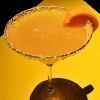

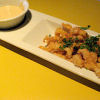
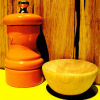
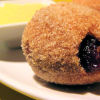
Two
22 Hawthorne Street
San Francisco, CA 94105
415 777-9779
downtown SF, restaurants
1 Comment »




 I am not an enormous fan of rum, except for when I’m vacationing in a tropical clime. Then, it’s practically the only thing that I want to drink. I blush to think of how many Painkillers I put away during our too-brief trips to the British Virgin Islands, and as soon as my feet touch the ground in Hawaii, I develop a thirst for Mai Tais that strains the bounds of good taste.
I am not an enormous fan of rum, except for when I’m vacationing in a tropical clime. Then, it’s practically the only thing that I want to drink. I blush to think of how many Painkillers I put away during our too-brief trips to the British Virgin Islands, and as soon as my feet touch the ground in Hawaii, I develop a thirst for Mai Tais that strains the bounds of good taste.








 At the beginning of June, we celebrated our fifth anniversary and spent part of the weekend in Napa. One of the highlights was a stop at Hoffman Farms. As Anita has
At the beginning of June, we celebrated our fifth anniversary and spent part of the weekend in Napa. One of the highlights was a stop at Hoffman Farms. As Anita has 






 Let’s get one thing straight right off the bat:
Let’s get one thing straight right off the bat: 










 This month’s Mixology Monday,
This month’s Mixology Monday, 




 In my youth, I was actually something of a photo geek: I built a darkroom in my parents’ garage, I worked for
In my youth, I was actually something of a photo geek: I built a darkroom in my parents’ garage, I worked for 





 I like to have a martini,
I like to have a martini,




 The descriptions of the food, physical locations, and presidential travel are either factual or based on our own experiences. The rest is best described like this…
The descriptions of the food, physical locations, and presidential travel are either factual or based on our own experiences. The rest is best described like this…




